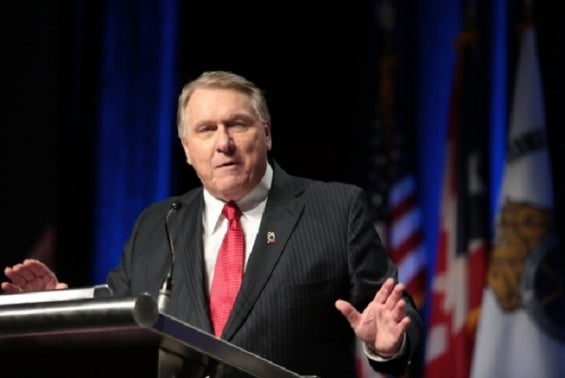News
Hoffa: American Workers Need Protection

By Teamsters General President James P. Hoffa
Published in the Detroit News, May 6, 2020
The coronavirus pandemic continues to affect hardworking Americans’ everyday life. Despite a plateauing of new cases, the toll this scourge is enacting on the public is immense. That’s why the Teamsters are pushing even harder now to protect our way of life.
Congress is returning to the nation’s capital, and we need lawmakers to get down to business so they can help both workers and those who worked hard all their lives. That means taking additional steps to make workplaces safer; protecting the hard-earned pensions of workers and retirees; and ensuring state and local governments have the funds they need to pay their employees so they can keep serving their constituents.
More than a million Teamsters are deemed essential workers, working in health care, transportation, grocery, food processing, warehouse, sanitation and corrections, just to name a few. These members and others like them need to be protected with comprehensive and enforceable safety standards in the next stimulus bill that comes to a vote on Capitol Hill.
Any legislation must require the Occupational Safety and Health Administration (OSHA) to issue a temporary emergency standard that covers all workers, including public sector employees in states that have not opted into OSHA coverage, as well as transportation workers not covered by another federal safety agency.
Congress and the administration must also provide funds for appropriate personal protective equipment and make those materials widely available. A non-retaliation policy is also a necessary piece of comprehensive health and safety standards to ensure that workers can report non-compliance violations without fear of reprisal.
Meanwhile, the COVID-19 pandemic has the potential to wreak havoc with multiemployer pension plans that are already in critical and declining status. Worker layoffs and furloughs will adversely affect contributions to these plans, thereby putting them on an even faster path to insolvency, and jeopardize the retirement benefits that active workers and retirees have earned.
The House majority included the Butch Lewis Act (HR 397) in their initial version of the last stimulus bill. During the discussion of the CARES Act, Senate Democrats also put forward a thoughtful proposal which created a partition program at the PBGC and ensured that participants would receive full benefits, while providing plans with a path to long-term solvency.
The next stimulus package should protect retiree benefits, do no harm to healthy plans, and provide the financial stability that multiemployer plans need.
Additionally, state and local government jobs must be protected. Some 200,000 Teamsters work in the public sector. The CARES Act approved in late March provided considerable state and local aid, but governments need much more assistance.
Congress must repeal the CARES Act rule that limits use of the $150 billion Coronavirus Relief Fund to only an unbudgeted response to COVID-19. This restriction blocks states from addressing the substantial revenue losses governments are experiencing at a time when there is also a sharp increase in demand for services.
Of course, these are far from the only needs. Lawmakers must also address hazard pay for essential workers; lifting the 500-employee cap for employers to offer paid leave to workers and COBRA health insurance subsidies for those forced out of a job; and beefing up consumer protections when it comes to debt collection and evictions, among other things.
At a time when some in big business are taking advantage of federal funding meant to help workers and small businesses, elected officials must move quickly and make sure future legislative fixes put people first.